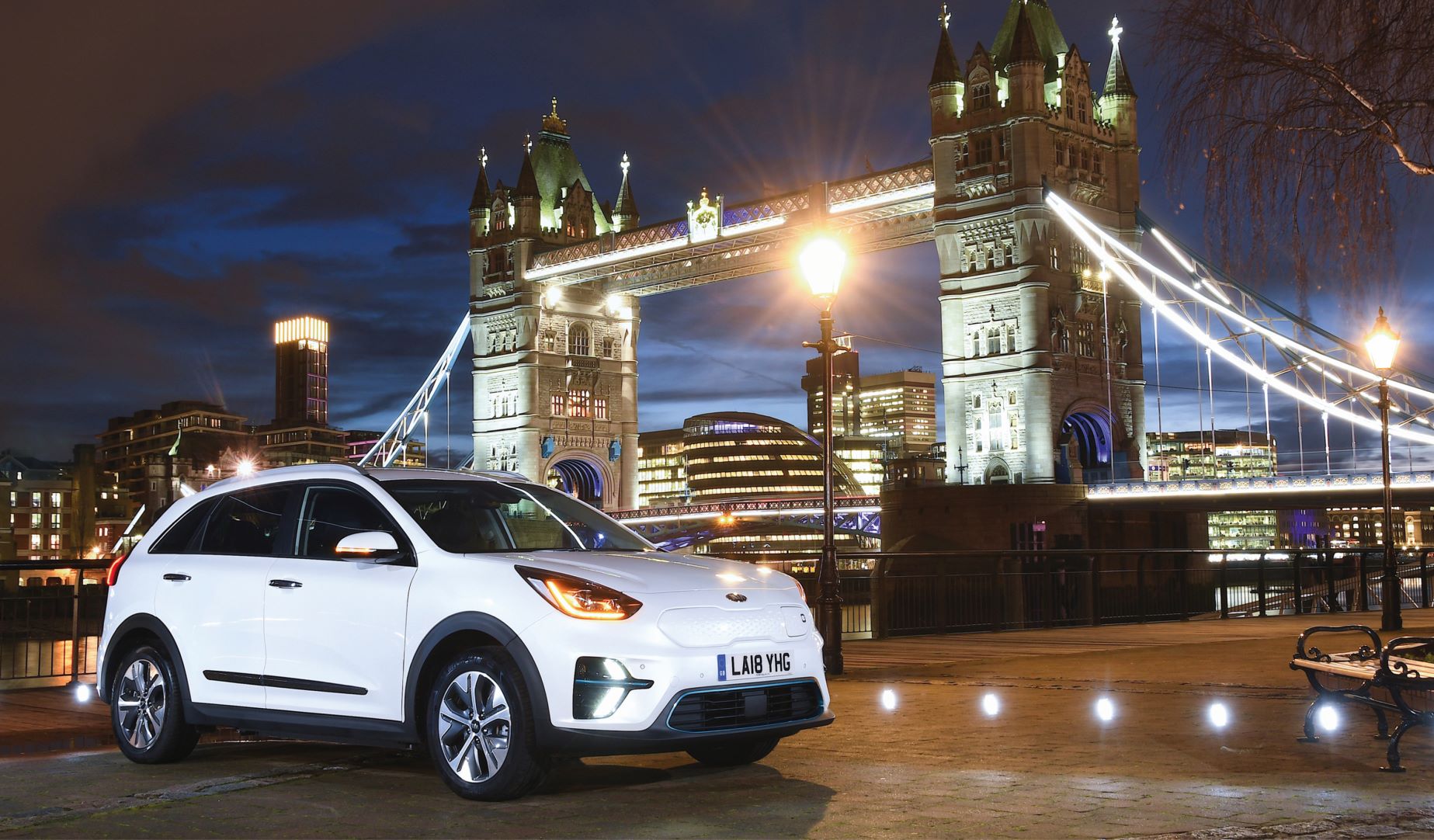
John Hargreaves, head of fleet and remarketing, and Steve Kitson, corporate communications director at Kia Motors UK both spoke to industry and media at London’s Soho Hotel about Kia’s moves to EV, considerations over benefit-in-kind rates (BIK), and a look over the fleet industry as a whole. Christoper Marchant reports.
During the event, Kia also revealed data collected from interviews with 150 fleet managers across the UK.
Over 60% of those interviewed indicated that their company fleet already included EVs and plug-in hybrids, an increase of 27% compared with data collected in 2018.
However, 80% of fleet managers expressed a level of doubt regarding the range of EVs, and whether this would make them suitable for fleet driving.
From Kia’s perspective, the Korean manufacturer will be launching the e-Niro in the UK from April 2019. The car will have a battery range of 282 miles, and the zero-emissions vehicle has already been voted What Car? Car of the Year for 2019 – a first for both an EV and a Korean manufacturer.
Steve Kitson said: “After opening the books for the e-Niro only a few weeks ago, we’ve already taken orders for the first allocation of vehicles. We’re working hard to get more.”
How well do you really know your competitors?
Access the most comprehensive Company Profiles on the market, powered by GlobalData. Save hours of research. Gain competitive edge.

Thank you!
Your download email will arrive shortly
Not ready to buy yet? Download a free sample
We are confident about the unique quality of our Company Profiles. However, we want you to make the most beneficial decision for your business, so we offer a free sample that you can download by submitting the below form
By GlobalDataFor fleet managers, Kitson did also carry a warning: “We expect to sell 1,000 this year, and we have prioritised retail customers as much as possible. We could probably sell all the allocation to fleet customers in an afternoon if we allowed them to take those big numbers, but we have to control supply, and we want to satisfy retail customers; we want it to be an orderly introduction.”
Kitson added: “We’re not closing the book to fleet customers, but it is quite possible that they will put in a big order knowing they won’t get them. We’re looking very carefully at how we allocate the vehicles that we have. We are seeking and making the strongest possible representations for additional allocations later this year.”
Whole-life costs
Kitson also made an admission when comparing the e-Niro to the recently released diesel SUV, the Kia Sportage. “It would be more expensive on a whole-life basis to run the e-Niro because the capital cost is much higher,” he noted. “Residual value would be strong, but it wouldn’t gain all that back. Certainly, in whole-life costs at the moment, the Sportage would still be a better bet.”
The e-Niro will retail at £32,995 after the plug-in car deduction offered by the UK government, while the Sportage starts at £19,140. Nevertheless, diesel vehicles have shown a rapid decline in UK registrations, down 29.6% year-on-year in 2018 according to the Society of Motor Manufacturers and Traders (SMMT).
“There is still a market for diesel, there is still a purpose to diesel, there is still a sensible role for diesel, and we will continue to offer the cleanest and most advanced diesel engines that we possibly can for those people who need them, but we have recognised for some time that trends are changing. Governments are changing direction; they want us to help them meet their targets on pollution – city councils such as Bristol are taking a particular stance on that.
“Of course, fleets have to operate in the overall automotive market and respond to changing customer demands, taking note of things like residual values, and we all know that falling demand for one particular field can affect RVs,” said Kitson.
Looking at the debate over diesel from a Kia business perspective, John Hargreaves said: “We were fairly strong in contract hire and we were very good with end-user fleet customers as well, so effectively we’ve grown the sales by building a little bit up in each channel rather than focusing only on one particular channel.
“In terms of fuel mix, we held onto our diesel percentage longer than other people in the market, but we are now at a similar level to market that percentage of diesel. I certainly think there’s still a big place for diesel.”
From April 2020, the UK government will set the BIK rate for EVs at 2%, compared to a minimum of 15% for petrol or diesel vehicles with no electric driving capacity. This is seen as a great incentive for fleet employees to consider the take-up of EVs, although this regulatory change has been clouded by the government’s decision not to bring forward the rate to 2019, and previous government’s inconsistency over rates in recent years.
On how the BIK changes might affect fleet, and fears of the government ‘moving the goalposts’, Hargreaves said: “It does seem like a lot of revenue to give away; we can’t really predict what the government is going to do on that. Certainly, when you look at the revenue that the government could lose, you could easily expect change.
“There is no indication either way, though it would be pretty difficult for the government, when they’re banging the green drum, to suddenly go: ‘Right, we went from 13% to 16% [the rise from 2018/19 to 2019/20], now we’ve gone down to 2%.’ I would hope for more consistency going forward.”
Questions still abound in the areas of green initiatives relating to how responsive the general public are to government initiatives that many have perceived as top-down. Outside the UK, President Trump pulling the US out of the Paris Accord was seen as an attempt to appeal to his voter base, while in France the increase in fuel duty was a key motive behind the ‘yellow vest’ protests against President Macron’s administration.
In the UK, the drop in diesel is not being matched by a rise in registrations of EVs, which still only made up 3.4% of the total number of UK registrations in 2018. Diesels are more typically being replaced by petrol equivalents, although Hargreaves explained the implications of this: some diesel owners are going to petrol, but not in droves. There has been a gentle surge in alternative fuel.
Hargreaves added: “Fleet managers have switched to petrol and realised after a couple of years that it is costing them a fortune at the petrol station every week.”
On whether diesel users will shift to electric, Kitson said: “I do believe that we’re approaching a tipping point. I think that there are a lot of people – retail customers, business customers, fleet managers – who are seeing EVs increasingly as a reasonable alternative. We hear about Generation Z who don’t drive cars, and lease a vehicle when they need it. I think there’s some validity in that, and those people who want to push to rent an EV rather than a diesel because they have that particular personal commitment. I still believe that their attitudes will change when they’ve got three kids and want to live in the suburbs.”
Kitson continued: “I think that there is a general awareness that electric is becoming a viable alternative for an average family motorist. It’s because of range; it’s because of availability. Increasingly what we’re seeing with the e-Niro is that it looks like a compact SUV; it looks more normal, and therefore people are prepared to consider it more.
“Why did Tesla do so well? One reason is that it’s a very good-looking executive-type car, so people in that demographic will choose it.”
Brexit concerns
While many in the UK manufacturing industry have issued concerns over the impacts of Brexit, including industry bodies such as the SMMT and the British Vehicle Rental and Leasing Association, Kia Motors UK remains bullishly confident that the terms of departure will not affect business with the UK or trade relations with South Korea.
Kitson noted: “The UK and Korean governments are working very hard to arrange a free-trade agreement. The suggestion is that it’s going very, very well.
“Our battery electric vehicles [BEVs] are made in South Korea. Leaving the EU will not necessarily impact the supply of alternative fuel vehicles into the UK. I don’t think that there is any focus in the minds of senior management in Korea to pander to a European CO2 target.
“We are not going to move away from our focus, and the UK is the biggest market for Kia in Europe, and the fifth-biggest market in the world. So would you handicap your fifth-biggest market?”
On the possibility of tariffs being imposed on Kia-manufactured battery packs coming into the UK, Kitson commented: “We don’t have any fixed plans at this point in time to have to fix tariffs on cars. We’re fairly confident that can be resolved: that is the indication we get from Korea and here in London and from our governmental affairs people in Korea. What will happen in Europe is different, but it doesn’t affect BEVs.”







